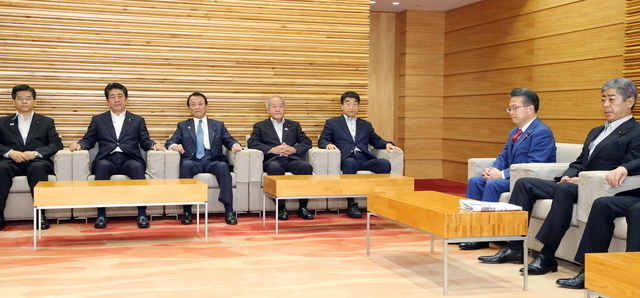Posted on : Sep.5,2019 16:56 KST
 |
|
Japanese Prime Minister Shinzo Abe (second from left), Finance Minister Taro Aso (third from left), and Minister of Economy, Trade, and Industry Hiroshige Seko attend a Cabinet meeting regarding the removal of South Korea from its white list of trading partners. (EPA)
|
As South Korea moves forward with removing Japan from its white list of countries that enjoy streamlined screening on exports of strategic materials, the Japanese government, under Prime Minister Shinzo Abe, has described Seoul’s decision as an “arbitrary retaliatory measure.”
South Korea’s Ministry of Trade, Industry, and Energy (MOTIE) announced on Aug. 14 that it would be revising the rules for exporting strategic materials by removing Japan from the white list, and Japan’s Ministry of Economy, Trade and Industry (METI) submitted a position statement to that effect during the canvassing period, which concluded on Sept. 3.
On Aug. 28, Japan’s METI pushed through a revision to its export and trade regulations that dropped South Korea from its white list, rejecting the South Korean government’s repeated appeals for dialogue and for Japan to roll back its export controls. That step was clearly economic retribution for the South Korean Supreme Court’s ruling that victims of forced labor during the Japanese colonial period must be paid compensation.
But the Japanese government at the time made the laughable claim that the exclusion was “not a retaliatory measure but an operational reassessment that’s necessary for appropriately managing exports in terms of security.” In short, Japan is arguing that its removal of South Korea from the white list is not retaliation, while South Korea’s reciprocal action is. This is the epitome of hypocrisy and absurdity.
Simultaneously, the Abe administration is contradicting its own claims. In a column published in Bloomberg on Sept. 4, Japanese Foreign Minister Taro Kono said that South Korea-Japan relations have been strained by the forced labor issue and asserted that the problem came down to both countries keeping the promises they’d made when they normalized their diplomatic relations. Japan is taking its case before the international court of public opinion in the hope that South Korea will shoulder the blame for the two countries’ deteriorating relations, but its story isn’t consistent.
On Sept. 4, South Korea’s MOTIE issued a rebuttal to the position statement submitted by Japan’s METI: “We’re revising the rules for imports and exports of strategic materials so as to more strictly manage exports to a country that is hindering international cooperation by operating its export control system in violation of international principles.” That seems to be a reasonable response to the Abe administration’s tenacious mendacity.
Unless the Japanese government evinces a change of attitude, its removal from the white list is expected to take place in about two weeks, following related measures, including a review by the Regulatory Reform Committee. While some think this step is necessary for South Korea to negotiate with Japan on equal terms, there are also concerns that it could negatively impact South Korea’s strategy in its lawsuit with the WTO and exports by local SMEs. The South Korean government needs to make the best choice after thoroughly assessing what is in the national interest.
Please direct comments or questions to [english@hani.co.kr]









